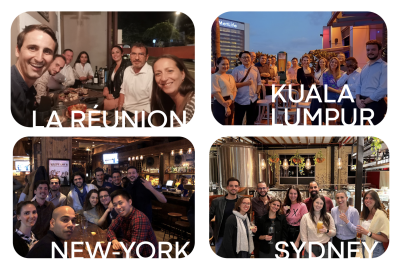News

Interview with Jean-François, a Graduate Living Abroad in Kuala Lumpur
The students of the "Kedge Alumni Travel" pro-act in Asia stopped by Kuala Lumpur, where they met with our alumni living abroad.
Graduation Year: 2005
Duration Abroad: 12 years
INTERVIEW:
Can you introduce yourself briefly?
Hello, my name is Jean-François Laubel. I grew up as an expatriate child and I’m currently living abroad in Kuala Lumpur. So in a way, it follows a family tradition — having experienced life abroad from a young age, I’ve always wanted to explore new adventures on my own. We lived in Sainte-Croix in the British Virgin Islands, and I attended primary school in Puerto Rico. At the time, I went to an American school because the infrastructure we have today didn’t exist yet. We often learned French on weekends at French Alliances to be able to write and understand our native language. I’ve always had the desire to move around, and for my wife and me, it was a family project to keep traveling.
We arrived in Kuala Lumpur in 2008. What made integration easier compared to other countries is that Malaysia is a former British colony, so everyone speaks English. It’s an extremely easy country to start an Asian professional experience. It’s a logistical hub that allows you to travel and work throughout Asia.
That’s why I chose to leave CMA CGM, who at the time asked me to return to Marseille. So my wife and I decided to leave the French (social) system.
Can you tell us about your education at Kedge? Did it help guide your career path?
I completed the two-year general management program at Euromed Marseille. I was in a work-study program, so during the week we worked in a company and had classes on Fridays and Saturdays. It was interesting for me because there was a mix of different professional backgrounds, which allowed for rich exchanges. Most people came from BTS or IUT programs, and we discussed why there were barriers to career progression with those backgrounds.
The pace was intense — when we got home, we had homework, group projects, and the pressure of performance at work. But it was part of our family plan to keep progressing and eventually move abroad to Asia. While working at CMA CGM, I witnessed Asia’s rapid growth and realized it was the future — the place where things were happening — and that I needed to be there to experience globalization firsthand.
So this program at Kedge helped me market myself internationally. In France, the system focuses heavily on education. Outside of France, it’s different — experience is what matters, and companies look at what you’ve accomplished. They approach you directly once they’ve identified your profile and ask if you’re interested in a position with “these responsibilities and this salary.” That’s how I was contacted for roles in Shanghai and Jakarta.
Personally, the Kedge program helped put me on the list of “expatriable” employees when I was working at CMA CGM.
You’ve been living abroad for 12 years — why did you choose this destination?
For my wife and me, Asia was always the goal. That’s why we planned to move to this continent. We love Asian countries for their ease and the kindness of the people. Initially, we wanted to go to China (especially my wife). But I knew China was a complex country to settle in — people can struggle with management styles and work culture. As a foreigner working in China, you have to be very careful with how you manage and approach things.
On the other hand, Southeast Asia is a simpler starting point with easier work management than China. However, in every country, you learn a lot about team management, sensitivities, and cultural approaches.
Have you noticed differences in work culture across countries?
There are many differences. For example, when we arrived in Malaysia to handle administrative paperwork, the official forms required us to declare our race and religion. It’s a shock at first, but it’s part of the system, and companies have access to this information.
You learn to manage a balanced team with people from different races and religions, assigning the right profiles to the right roles. It’s a delicate process — placing someone of a certain race or religion in a team doesn’t always work. You learn a lot because every country is different. To understand all this, I often went from office to office to observe what people were doing and to understand who’s who and who does what.
The work environment in China is unique — it’s extremely nationalistic. You can’t criticize China or express any dissent; you’re there solely to work. Many expatriates leave China feeling drained. I personally spent three years there and came out “exhausted.”
After 8 years in Kuala Lumpur, do you plan to stay or do you have other projects?
We do have other projects. We're not talking about retirement — we're here to work. Malaysia is a great hub for logistics and various types of roles because it allows you to easily respond to all kinds of demands. Asia is changing a lot; we’re seeing an increasingly visible pursuit of profit, with many opportunists, so in a way, Asia is losing some of its character for us. We’re currently considering a plan B, hoping to keep a base here in Kuala Lumpur, but possibly relocating to Eastern Europe — countries like Bulgaria, which is poor, yes, but has potential for the future.
So the plan would be to return to Europe, but not to France. We’re not rejecting France — we love it — but we don’t want to live there again. I personally go there for holidays, to see family and friends, and for the beautiful landscapes, but we don’t see ourselves moving back for now.
Do you have any advice for graduates and future graduates who are considering moving to Asia?
For me, it’s undeniable — you have to go abroad. Come to Asia! It’s a great school of life, and so much is happening here. Coming to Asia will open doors and put you on a different level compared to other students. There are countless opportunities, and you can quickly find yourself in major companies in interesting positions. With an open mind, some language skills, and curiosity, the doors are wide open.
However, it’s important not to forget that there’s always a risk when you leave the French system. Indeed, when you go abroad on a local contract, you earn a decent salary compared to France, but there’s always a risk — the company can terminate your contract overnight. I experienced this in Shanghai and Jakarta. It’s a risk you need to take into account.
Interview conducted in Kuala Lumpur by Clémence, Stivell, Estelle, and Adel, students of the KEDGE Alumni Travel pro-act in Asia.
TO LEARN MORE ABOUT THE KAT PROJECT
FOLLOW THEM ON INSTAGRAM
FOLLOW THEIR ADVENTURES ON FACEBOOK






